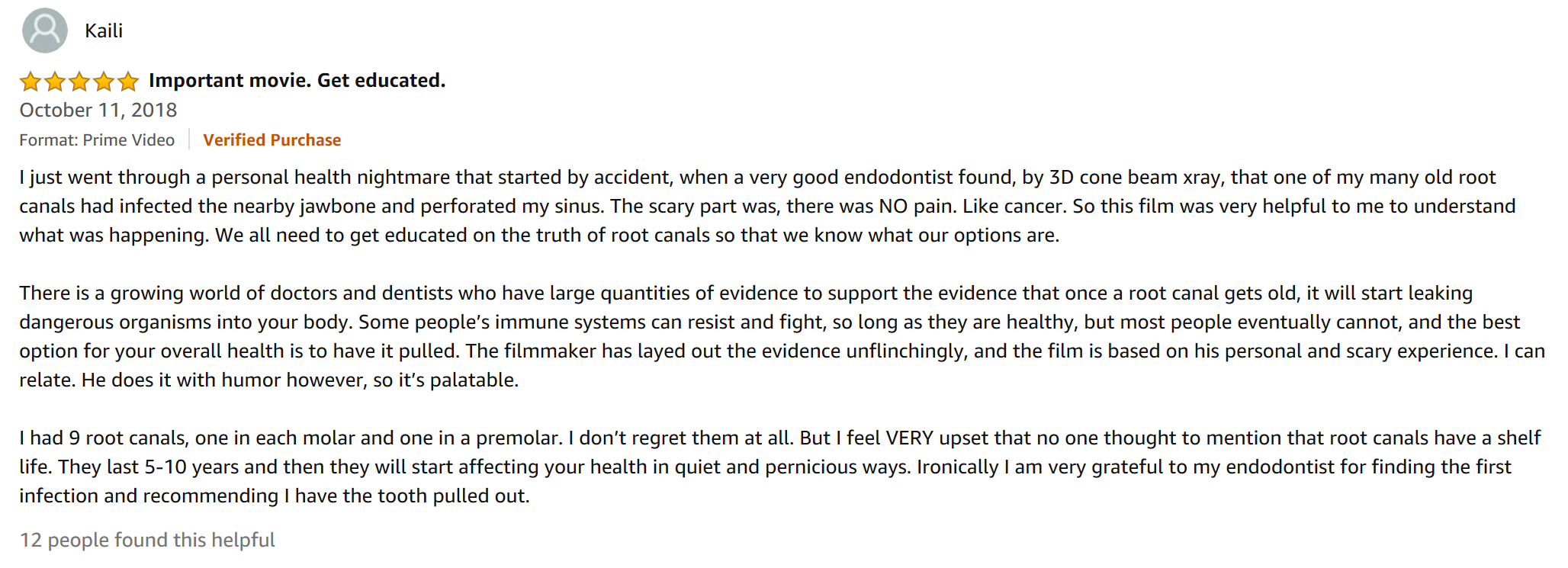Netflix's "Root Cause" re-sparks debate on content censorship
Netflix's "Root Cause" risk creating a global oral health crisis.
by KEVIN KUO, DDS, MMSc | March 7, 2019
Netflix's rise to global domination of the subscription video streaming business has been well-received. As of January 2019, the media-service provider boasts almost 140 million paid subscriptions around the world (1). The company has transformed how viewers consume films and programs with on-demand streaming of a virtually endless library of entertaining video content. Netflix Originals, exclusive Netflix distributed productions like the House of Cards, are also given excellent reviews by critics and consumers, alike. Overall, according to Digital Trends, Netflix "blows the doors off the competition" as far as its content library (2).
In a way, Netflix's popularity has created public trust as a reliable media curator.
This consumer sense of trust can be a major problem in one particular genre of supposed nonfictional films on Netflix, documentaries. "Root Cause" is especially concerning as Netflix categorized this Australian indie film as such a genre (3). This new addition to Netflix's library characterizes root canal treatment as the defining source of systemic ailments on a young man's life. The film uses questionable expert testimonies by unconventional physicians and dentists to describe the "root cause" of various diseases, although scientifically untrue. RootRadar CEO and root canal specialist Dr. Tom Pagonis clearly voices this misrepresentation in his article here.
However much untrue, "Root Cause" can be potentially believable as shown on Netflix, with its engaging storyline and interesting visuals, to millions of people around the world. This widespread misbelief could risk creating a global oral health crisis in an already concerning global disease. According to the World Health Organization, an estimated half the world's population are affected by dental caries, and much lead to endodontic disease which is treated with root canal treatment (4).
Should Netflix remove "Root Cause" from its video-streaming library?
This concept of content censorship is certainly under great debate. The debate between censorship and free speech rights was hugely discussed earlier in 2018 when technology companies, like Apple, Facebook, Twitter, and Google, independently decided to remove Alex Jones and Infowars from their sites. Opponents of removal cited first amendment rights, while proponents noted that corporations were allowed by law to self-monitor their own policies (5). Certainly, this debate is still potentially ongoing with Netflix and "Root Cause".
To make matters worse, Amazon Prime Video and Apple also carry this film and label it as "documentary". The two companies have garnered less notoriety for their video library as compared to Netflix, but both media providers are obviously still trusted by consumers.
Here are just a few disturbing viewer comments on Amazon:
KevinDental suggests the following solution.
Immediately, dental governing bodies around the world should collectively inform Netflix et al. and the general public the potential dangers and inaccuracies of "Root Cause". We at RootRadar understand the difficult position health organizations have in managing such internet misinformation. One can argue that creating an official statement could create more popularity for the film. But more on this later.
Netflix and other media providers need to remove "Root Cause" from their library and change their future acceptance criteria to disallow scientifically questionable documentaries. We at RootRadar also understand these corporations' dilemmas in content management. They deliver engaging and often controversial content that their customers want to view. It is sometimes to their benefit to keep questionable content available, even if it is short-term.
Here are some possible compromises:
Re-categorize "Root Cause" from documentaries to another genre.
State a clear and obvious disclaimer in the film to state its scientific inaccuracies.
A KevinDental Concept
What is the role of healthcare providers and dentists in this debate?
KevinDental recommends INTERNET IMMUNITY. Right now, traditional scientific and medical institutions release public statements to questionable online content only after they have already become viral, for understandable reasons. At the same time, we at RootRadar believe that proactive education before widespread untruths is a better goal, especially in medicine and dentistry where people's health is at risk.
Please share this story along with our previous article.
"Root Cause" has successfully attracted major media streaming providers to carry their video, but the film has not hit full mainstream at the moment. We still have a chance to create #InternetImmunity!
References
1. Q4 2018 Letter to Netflix Shareholders. (2019, January 17). Retrieved January 26, 2019, from https://s22.q4cdn.com/959853165/files/doc_financials/quarterly_reports/2018/q4/FINAL-Q418-Shareholder-Letter.pdf
2. Netflix Vs. Hulu Vs. Amazon Prime: Battle Of the Streaming Giants. Ryan Waniata-Ryan Waniata - https://www.digitaltrends.com/home-theater/best-on-demand-streaming-services/
3. Root Cause. https://www.netflix.com/title/81000862
4. Oral health. (n.d.). Retrieved January 26, 2019, from https://www.who.int/news-room/fact-sheets/detail/oral-health
5. Snider, M. (2018, August 09). Why Facebook can stop Infowars and not break the First Amendment: Analysis. Retrieved January 26, 2019, from https://www.usatoday.com/story/tech/news/2018/08/09/why-facebook-can-censor-infowars-and-not-break-first-amendment/922636002/








